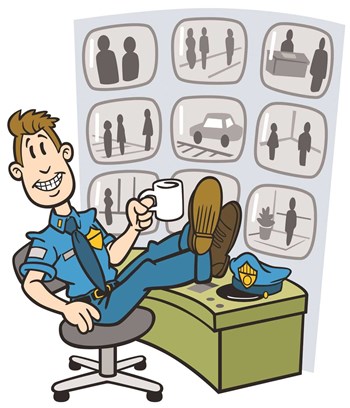
There are many different factors that prospective condominium owners take into account when looking to buy a unit. Aesthetics, price, and location are important, for sure. But perhaps the most critical factors of all are the safety of the building and the neighborhood it’s in.
Despite the country's urban areas reporting fewer serious crimes in recent years, it would be naïve—not to mention irresponsible—not to take proper steps to safeguard one's home and loved ones. To that end, most condominium associations and boards of directors employ some sort of surveillance on their properties to keep watch over them in a visible way, and give residents a sense of security. Unit owners can expect to see those ubiquitous cameras in hallways, in garages or parking areas, near elevators, and at common areas like pools, tennis courts, or other amenities.
Do Cameras Really Provide Security?
Fundamentally, cameras are just mechanical eyes. While they may deter crime to some degree, when it comes to security, their prime purpose is to record happenings in an environment for use later by condominium boards and hired security staff if a problem is reported.
That’s the catch. Whether or not there are security stations and guards on a property, it’s rare that someone is sitting there watching the surveillance video feed 24 hours a day, seven days a week. Some attorneys caution condominium owners that having cameras on site doesn’t mean that the environment is safer than if they were absent.
“When [boards] set up security cameras, they have to be very careful because they're assuming a duty they legally don't have, and if they do it negligently, they can be liable. If you put up a security camera, and it doesn't prevent a third party from harming a resident, they can sue the association, and many times be successful if the association didn't follow through and take the proper steps to secure their safety. You can't just put up cameras and walk away,” says Lara A. Anderson, an attorney at the law firm of Fullett Rosenlund Anderson, PC in Lake Zurich.
So the questions remain: Does having numerous cameras around actually make a difference? Do management companies find that properties with a greater security presence experience a drop in crime?
The short answer is yes. If unit owners and visitors see cameras around the property, then there is the immediate assumption that there is someone, somewhere, monitoring the feed—and that it's probably best to mind one's Ps and Qs.
Reasonable Care
So while the sight of an unblinking mechanical eye can discourage some types of crime, small condominium associations beware; if you’re going to put cameras in place and provide residents with that comforting feeling of security, then it is your duty to maintain those cameras with reasonable care.
“There's no requirement that you provide surveillance or monitoring by cameras. It's more of a practical consideration. Would you have any benefit to be gained by having cameras? Is it a real camera, as opposed to a dummy camera? Sometimes people think since a dummy camera is cheaper, why not? If you put a false camera up, then you might be giving people a false sense of safety,” says Michael C. Kim, an attorney at Michael C. Kim & Associates in Chicago.
While condominiums are not required to have cameras on site, if the community is in a high-crime area, management should want to know what’s going on so they can put a halt to any mischief. Put simply, residents don’t want to live in a high-crime area, and managers want people to occupy their homes in peace.
“If you start having repeated incidences of crime on the property, and the association doesn't do anything at all, there's an argument out there that they're breaching their fiduciary duties by turning a blind eye on the property. There could be a situation where it's in the best interest of the board to install cameras, or hire a security guard,” says Anderson.
But once the idea of security cameras is introduced to an association, who has the power to install them, and how will the association pay for it? “It's the primary duty of the board and the right to regulate to the common area is within the purview of the board. So it's like instituting any policy. It has to be reasonable. Are they only putting it on floors where there are protected classes; families with children, for instance,” says Sima L. Kirsch, a Chicago-based attorney.
Where You’re Being Watched
In addition to fundamental security, condominium owners also have an expectation of privacy. That means that when you’re inside the comfort of your own home, you don’t want or expect to have your board, neighbors, or association staff breathing down your neck, monitoring your movements, or otherwise invading your personal space. “The right of privacy that's protected in the Constitution is by the state against the individual, not a private corporation. When people buy units in a condominium environment, they're buying individual ownership, and they own the common areas jointly. And those are the areas that they cannot raise the privacy spectrum,” says Kirsch.
But inside individual apartments are completely off limits for surveillance. Anderson says that if an outside security camera even captures part of someone's window that shows the inside of their apartment, that can be a direct violation of privacy. Kirsch says there have been instances of people in more high-income buildings installing their own video surveillance in front of their door. In that case, as long as the video only captures what's directly at their door, and not any of the common space, it does not violate condo law.
So where are some of the places that management or security companies most definitely want to make sure your property has surveillance? Basically anywhere that's a common element is fair game. “You look at whether or not the area that's surveilled, people have a reasonable expectation of privacy. If you have a camera in the lobby area, generally a public area, people can come and go without any interference. Those would be considered public areas. If you had a restroom facility, even though it's a common facility, there would probably be a legitimate expectation of privacy. It's almost common sense,” says Kim.
Other Popular Measures
When evaluating condominium security, look beyond the camera. In many of today’s neighborhoods, boards are issuing key cards and key fobs. These devices can monitor when residents enter and exit a common area of a building or association. Another benefit of this kind of access technology is that if something were to happen—say an owner were to lose his or her access card, or the management company had to restrict someone's access for whatever reason—all the manager has to do is go into the computer system and deactivate that resident's unique card or fob. These developments in technology make everything much easier for managers and unit owners alike, because no one has to keep track of keys.
Prospective buyers might also want to inquire if there is a live security team monitoring the video feed in any community they're considering buying into. If there is a security team, there is a higher possibility that action can be taken immediately upon an incident or very soon thereafter. Some properties may not have on-site security staff, but are able to be monitored by staff in different towns, or even different states.
Perhaps startling to some residents is the fact that unit owners can access surveillance footage of their community's common areas at any time and for any reason, so long as they submit a written request. It's no different than any other record request. It would probably be under Section 19, where they would have to express a stated purpose. They're not like board minutes, which are open to everyone because they have personal information on them, and a board can't let personal information out,” says Kirsch.
To be aware of the time frame for reporting an incident, unit owners may want to inquire with their management company how long video records are kept. Suggestions differ as to how long condominium associations should keep their security footage. While certain management companies may only hold onto the footage and images for 24 to 48 hours, others may keep it for up to six months.
What should your particular HOA's policy be for keeping security cam footage? “Generally speaking, especially if you have a reasonable prospect, that the matter will be subject to some proceeding, you should preserve that information. If you destroy it, that's illegal, and there can be consequences just for destroying evidence,” says Kim. For injuries and similar types of lawsuits, the statute of limitations is two years for most cases. “If the association knows of an event—maybe the doorman mentioned Mr. Smith came in and he was a little bit inebriated, so he slipped and fell, but he seemed to be okay. I would still keep that tape. It may never become a claim, but at least for the period of time that there is a potential for that kind of exposure,” says Kim.
However, cost and storage space do place some restrictions as to how long the footage can be kept around. Some systems, for example, may have an actual tape that can hold 24 hours of footage and then it automatically kicks back, recording over the previous day’s footage at the start of each new day. That means associations would only have a 24-hour window to review footage in the wake of an incident.
That online availability and image storage could make security records available for longer than a straight tape feed. However, keeping that imagery requires server space and that server space can be very expensive. In most cases, condominium associations are only fronting the money to increase storage space if they have a good reason.
While real cameras and other technology may make even honest citizens feel a bit nervous, security measures—in increasing dosages—are here to stay.
Emile Abbate is a freelance writer and a contributor to The Chicagoland Cooperator. Editorial Assistant Tom Lisi contributed to this article.






Leave a Comment